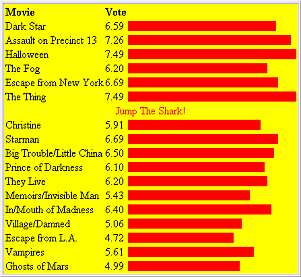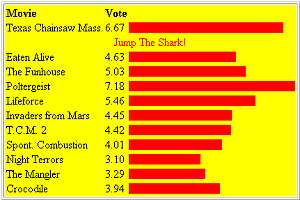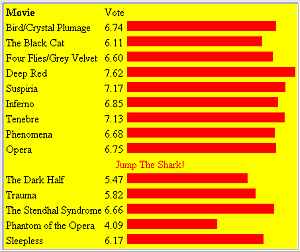When Good Directors… GO BAD!!!
There’s a website, Jump the Shark, which is devoted to trying to pinpoint the moment when once-great TV shows “lost it” e.g. the musical episode in Buffy, the arrival of Joxer in Xena. It’s not, however, a concept limited to television. We’re all familiar with film-makers, on both side of the camera, who appear on the scene in a blaze of glory early in their careers, a shooting-star soaring across the firmament, only to crash and burn in an equally meteoric way, reduced to churning out a steadily-decreasing standard of dreck.
But why is the horror genre so particularly blessed with these? It seems to suck the very life out of directors, to the extent that I can think of only one who has maintained genuine quality in his work for more than a few years: David Cronenberg. Let’s take a look at a few particularly fallen angels, and see if we can find when they jumped their sharks. For assistance, we call on the surveys in the Internet Movie Database, whose users are able to rate movies on a scale from one to ten…

Exhibit A in any such discussion must be John Carpenter. In the late 70’s and early 80’s, he showed near-genius level talent, first with Halloween and then The Thing, which both remain classics even now – rarely has the slasher movie or alien invasion pic respectively been done to such good effect.
My hypothesis is this: at some point on the set of Christine, Carpenter was kidnapped by aliens and replaced by an almost-identical double. The only way to tell them apart, is that the clone lacks any artistic talent – the theme of extra-terrestrials which look just like us is a familiar one in his work, perhaps a subtle clue to those viewers able to pick up on it. The real Carpenter is probably making TV commercials on Alpha Centauri.

Next up is Tobe Hooper – you know your career is a bust, when you’ve made ten films, and Lifeforce gets a place on the podium (hey, I like it, but it’s not one of those I could defend to anyone else). If Hooper ever possessed any ability, it appears to have evaporated completely in the past decade – the last movie Hooper directed whose score reached the dizzy heights of, say, 4.0, was way back in 1989.
There is one bump on the steady road towards TVMs and video-premierdom: Poltergeist, the highest-rated film of Hooper’s career. Or it would be, if the authorship of Poltergeist wasn’t severely in doubt. Much evidence points towards Steven Spielberg, who conceived, co-wrote and produced it, as well as allegedly taking over all post-production. Producer Frank Marshall has said Spielberg was on set constantly and would step in when Hooper was indecisive, and it seems likely Hooper was hired to act as an ‘Alan Smithee’, allowing Spielberg to sidestep around a clause in his E.T. contract.
With a big warning * beside Poltergeist, it really leaves only Texas Chainsaw Massacre worthy of note. The presence of much actual directorial talent here is also questionable: looking at the subsequent filmographies of pretty much everyone involved, it seems like one of those happy coincidences, where the resulting product exceeded the talents of most of those involved. [See also Miracle Mile, Enter the Dragon and Heathers] Hooper was simply in the right place at the right time, and has been living off those pickings for more than 25 years.

Finally, a trickier example: Dario Argento. Looking at his graph, we first see an increase, through his early 80’s work, and only then a drop off. As you’d expect from a man who illustrates well the thin line between genius and lunacy (often managing both in the same movie), it’s harder to pinpoint one specific production when he lost it. At first glance, after Deep Red would appear to be the obvious choice, but you’d be hard pushed to justify calling his ‘Three Mothers’ trilogy, whose average sits above 7.0, as the work of someone past his prime.
Personally, I would pin-point the moment, not just to a film, but to the end of Opera, which is so utterly laughable and ludicrous (yes, policemen routinely mistake tailor’s dummies for corpses), it was clear that Argento had blown his talent. Once we get past that film, however, it’s clear that something happened – too much drugs, according to some reports. Being fair, we can’t blame him entirely for The Dark Half, since there’s no way for IMDB voters to separate his portion from Romero’s. But Trauma, his subsequent solo project, was hardly any better, and after a brief upshot for Stendhal, he was back down, almost to Tobe Hooper levels, for Phantom of the Opera.
However, a miracle would appear to have occurred this year, with Sleepless bucking the trend to rate a full two points higher than his previous movie – a turnaround not seen for Carpenter or Hooper. However, caution would be urged, not least because the film hasn’t had an American release, so as far as IMDB voters go, I suspect it has been seen largely by (the few remaining) sad Argento fanboys. The jury will therefore remain out on that one, and a final staking of a former great talent is on hold pending the TC review…
Does this “prove” anything? Not really. But it seems that the point at which directors jump the shark is likely to be around the time that their movies are worse than their debuts. This makes sense, in that you would expect someone to get better with experience – and also, budgets will probably also be bigger, improving the technical aspects. If later movies are no improvement over your first, than clearly something pretty questionable is going on with your career.